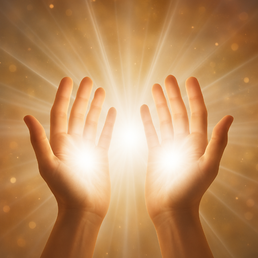
✨As Reiki practitioners, meditators, and metaphysical explorers, we often feel the energetic shifts — the peace after a session, the clarity from a breathwork practice, the inner knowing that something real is happening. But what does science say?
This week, we're diving into the latest reputable research on Reiki, meditation, and metaphysical practices — separating the mysticism from the measurable, and exploring how ancient modalities are finding their place in modern medicine and neuroscience.
🧘♀️ Meditation: Strong Evidence, Proven Impact
If there’s one area where science and spirit shake hands, it’s meditation. Here's what research is showing:
-
A massive meta-analysis of 78 neuroimaging studies found distinct brain activation patterns based on different styles of meditation — from loving-kindness to focused attention. These changes are seen in areas linked to emotional regulation, compassion, and interoception (your sense of what’s happening inside your body).
-
Veterans with PTSD showed significant improvement after just 8 weeks of Mindfulness-Based Stress Reduction (MBSR). Brain scans revealed enhanced theta wave activity — linked to calm focus, resilience, and deep emotional processing.
-
In a more creative study, researchers combined art and mindfulness for 21 days and found measurable improvements in breathing, relaxation, and stress response — especially in beginners.
🔬 Bottom line: Meditation isn’t just helpful — it’s neurologically transformative. This is a well-researched, evidence-based practice that rewires the brain and regulates the nervous system.
👐 Reiki: Encouraging Evidence with Caveats
Reiki continues to sit in the gray zone between energetic healing and medical skepticism. Here's the balanced truth from recent peer-reviewed studies:
✅ Positive Findings:
-
A 2025 systematic review of 11 randomized controlled trials found that Reiki significantly improves quality of life (especially with longer or consistent sessions).
-
Reiki helped reduce anxiety in cancer patients, caregivers, and medical staff alike — most notably after 8+ sessions of 60 minutes or more, or very short acute sessions in stressful environments.
-
Reiki is recognized as completely safe, with no reported adverse effects, even in vulnerable populations like cancer patients and surgical wards.
❌ Limitations:
-
Many scientists still classify Reiki as pseudoscience due to the lack of measurable “universal energy” and inconsistent study designs.
-
Critics point out flaws in research design, placebo-controlled comparisons, and lack of biological plausibility in conventional frameworks.
-
As a result, Reiki is often omitted from mainstream clinical programs, despite its growing popularity and anecdotal success.
🧪 Bottom line: Reiki shows strong promise in improving well-being and reducing anxiety — especially when practiced consistently — but it remains controversial in academic and clinical spaces.
🔮 Where Innovation Meets Intuition: Metaphysical Trends in 2025
The future of metaphysical healing is hybrid. Here are some emerging trends:
-
Reiki is being blended with sound healing, binaural beats, crystal grids, and frequency therapy to create more immersive experiences.
-
AI-powered healing platforms and digital Reiki apps are gaining popularity, offering personalized attunements and session replays with biofeedback integration.
-
There’s a rising interest in using astrology, biofield scanning, and quantum language techniques to fine-tune healing intentions and affirmations.
These shifts reflect a collective desire to integrate ancient wisdom with modern tools, bringing metaphysical practices into the tech age — while keeping the soul at the center.
🌱 Takeaway: Bridging the Gap Between Science and Spirit
If you’ve ever felt like you needed “proof” that your spiritual practices are valid — here it is.
✅ Meditation? Backed.
🌀 Reiki? Gaining ground, with strong anecdotal and emotional impact.
💫 Metaphysical healing? Evolving fast, driven by both intuition and innovation.
Whether you're a practitioner or a seeker, you don't have to choose between evidence and energy — you can hold both. Stay rooted in what works for you, and stay curious about the research that’s finally catching up.


Add comment
Comments